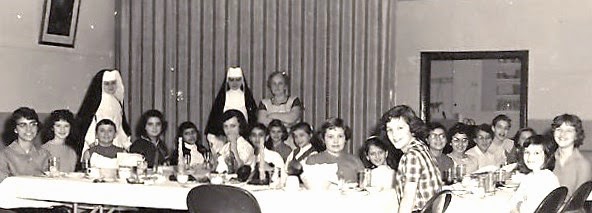Call the Midwife
Rekindling memories
As the season finale of Call the Midwife unfolded, I was reminded of my childhood in the coalfields of West Virginia. My grandparents had settled there, taking jobs in the mines. They gravitated toward what was familiar from their homeland and that included the Catholic church.
 |
| Logan County, West Virginia, in the 1950s, Courtesy Goggle Images |
Members of the Pallottine Missionary Sisters somehow had ended up in this mountainous region, nestled in a narrow valley in the far west corner of the state.
Our Lady of Mount Carmel Catholic Church would never have survived without their constant leadership and direction.
The nuns in the PBS series brought to mind those days of spending many hours at church with instruction by this amazing group of women. Weekly catechism classes, Mass attendance, and special events were my first encounters with the women in black. As in the TV program, the ages ranged from the elderly nuns, somewhat retired, to the young ones, beginning their careers.
Catechism was required by all children throughout their school days. Classes were held at homes of parishioners with transportation to and from sessions required by the families. My dad and uncles provided the drivers since most of our moms did not drive, and none of them could ever tell a nun “no” when asked to fulfill a task related to the church.
Preparation for the sacraments of Holy Communion, Penance, and Confirmation were part of the lessons, but we always attempted to waver from the required lessons. One of the younger nuns, Sister Marguerita, was especially vulnerable to our idle chit chat and would sometimes join us as we veered off topic. After all, how much rote instruction could second graders take at a time?
I will never forget the gleam in her eyes as she stood there in her head-to-toe habit, talking about such exciting things as washing cars. Somehow with our immature topics, we could manage to get her engaged in our diversionary tactics. She always fussed at us for provoking her, but I think she needed a break, too.
Sister Ludwiga was the elder of the group, whose heavy European accent made us all struggle to understand every word. But she was so kind and helpful, we never missed a beat showing her the respect she deserved. In those days, when we attended Sunday Mass, children sat with the nuns in the front of the church, boys on one side and girls on the other. It was Sister Ludwiga who often delivered a quick tap on the shoulder to remind us to be still, quiet, or stop any other distraction committed.
 |
One of the many events the nuns supervised during my
childhood at Our Lady of Mount Carmel Catholic Church.
|
The leader of the pack, Sister Carmen, was a formidable force no one could dismiss. Priests would come and go, but the nuns were a constant. She knew all the families, community background, and what needed to be done. She organized the Ava Maria Club for girls that met every Saturday. While we performed various chores around the church, there were plenty of times for other pursuits --- birthday parties, field trips, jam making and sampling, and much more.
This group morphed into the Catholic Youth Organization as we grew into teenagers, and the boys were allowed to join. Activities changed but the leadership was constant as we hosted many dances and included teens throughout the community.
Probably the last episode of Sister Carmen’s influence on my life was when I got married. My future husband was a non-Catholic and his father was a lay minister. Of course, we wanted him to help with the service. The Pope had actually ruled on that issue the summer of our wedding and would allow it--totally coincidental timing. At first, the local priest told me it would not be possible. I remember agonizing about it and had no idea how to break it to it to my fiancé. Somehow the priest miraculously changed his mind and did allow it. I have no idea how it all got changed, but I felt Sister Carmen was behind it.
Thank you “Call the Midwife” for bringing back these fond memories and for humanizing these wonderful women who did so much for so many children. I know some people have horror stories about their experiences in the church, and for that I am so sorry and find it inexcusable. I wish they could have had the positive productive encounters I had.
For an hour on Sunday nights, I am enthralled with the important work of the midwives and nuns in a section of London that desperately needed their help. They are embraced and welcomed by the families, similar to those years when European immigrants come to remote mountain towns and gravitated toward the church for comfort in a new land.



























